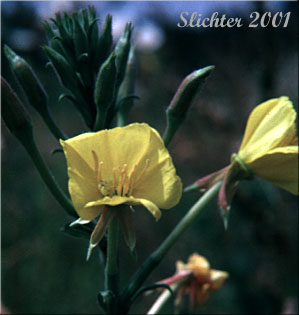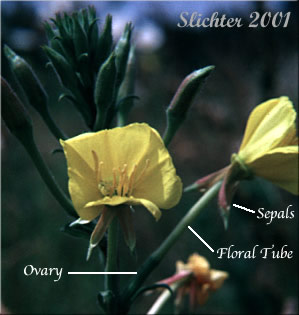

 The
photo at right shows Hooker's evening-primrose found east of Gresham, OR.........mid
July, 1990.
The
photo at right shows Hooker's evening-primrose found east of Gresham, OR.........mid
July, 1990.
Hooker's evening-primrose is also known as western evening-primrose. It is a fairly attractive biennial to perennial wildflower with simple or sparingly branched stems which are mostly erect. The stems often attain heights from 30-250 centimeters. The herbage is spreading-pubescent with hairs of two lengths, the longer hairs often reddish in color. The numerous leaves are spatulate to oblanceolate in shape, ranging from 5-20 cm long and 1-2.5 cm wide. The margins are mostly entire or may occasionally have small teeth. The lower leaves have short petioles while the upper leaves are subsessile.
The floral tube is 2.5-5 cm long. The 4 sepals range from 20-25 mm long. The 4 yellow petals range from 2.5-4 cm long and usually age to an orange or reddish-purple color. They are broadly rotund -obovate in shape. The stamens are subequal and over half the length of the petals. The anthers are up to 1 cm long. The style rises 2-4 cm above the opening of the floral tube while the stigma lobes are linear, each to about 5 mm long. The fruit is a capsule from 3-4 cm long and 4-6 mm wide. The capsule is erect or closely ascending and is widest near its base, gradually thinner towards the distal tip.
The plants found in the Pacific Northwest belong to the variety hirsutissima.
Hooker's evening-primrose is often included in western wildflower seed mixes. Be aware that as with many evening-primroses that it sets abundant seed and tends to be the dominant plant in the wildflower garden after a year or two.
Hooker's evening-primrose may be found in disturbed places such as roadsides, gardens, and fields.
Hooker's evening-primrose may be found across much of the western United States. It is found from from western Idaho, southeastern Washington, and northeastern Oregon south through much of California to Baja California and eastward to Utah, Colorado, New Mexico, and southwestern Texas.
